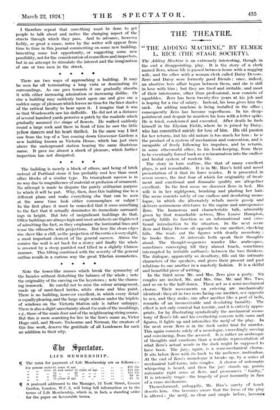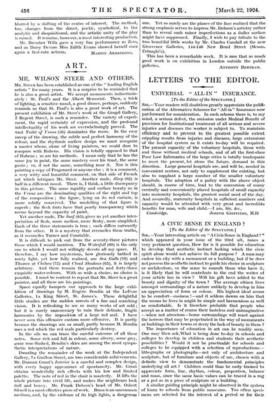THE THEATRE.
" THE ADDING MACHINE," BY ELMER • L. RICE (THE STAGE SOCIETY).
The Adding Machine is an extremely interesting, though in the end a disappointing, play. It is the story of a clerk named Zero, whose life ig passed between home with a nagging wife, and the office with a woman clerk called Daisy Devore. Zero and Daisy were formerly good friends : once, indeed, an abortive love affair began between them, and she is still in love with him ; but they are tired and irritable, and most of their intercourse, other than professional, now consists of squabbles. Zero has been twenty-five years at his job and is hoping for a rise of salary. Instead, his boss gives him the sack. An adding machine is being installed in the office ; consequently Zero has become superfluous. In his disap- pointment and despair he murders his boss with a letter spike. He is tried, condemned and executed. After death he finds himself in the Elysian Fields, where he is joined by Daisy, who has committed suicide for love of him. His old passion for her returns, but his old nature is too much for him : he is the product of a system of mechanism and convention, and is incapable of freely folloWing his impulses, and he returns, in some otherworld office, to his book-keeping, from there to be eventually forced back as a reincarnation into the endle'ss and brutal system of modern life.
The story in bare outline, like that of many excellent plays, is not remarkable. It is in Mr. Rice's bold and novel presentation of it that its force resides. It is presented in seven scenes, the first four of which for originality of treat- ment and emotional and dramatic quality are altogether excellent. In the first scene we discover Zero in bed. His wife is in her nightgown, brushing and plaiting her hair. The scene consists solely of one endless and desolating mono- logue, in which she alternately retails movie gossip and delivers acrimonous strictures to the supine and unresponsive Zero. The humorous and characteristic talk, admirably given by that remarkable actress, Miss Louise Hampton, exactly fulfils its function as an informational and emo- tional introduction to the situation. In the next scene Zero and Daisy Devore sit opposite to one another, checking bills. She reads out the figures with deadly monotony, : he books them. At intervals both speak their thoughts aloud. The thought-sequences wander like arabesques, sometimes converging till they almost touch, sometimes interrupted by irritable outburst, between the two thinkers. The dialogue, apparently so desultory, fills out the intimate characters of the speakers, and gives their present and past relations to one another in a masterly fashion. It is a skilful and beautiful piece of writing. •
In the third scene Mr. and Mrs. Zero give a party. Six couples arc invited, Mr. and Mrs. One, Mr. and Mrs. Two, and so onto the half-dozen. These act as a semi-mechanical chorus. Their movements on entering are mechanically identical : they sit in two rows facing one another, sex opposite to sex, and they make, one after another like a peal of bells, remarks of an inconceivable and desolating banality. The effect is not only comical but terrible, and it is entirely appro- priate, for by illustrating symbolically the mechanical mono- tony of Zero's life and his everlasting concern with sums and figures, it lights up and intensifies the motif of the play. In the next scene Zero is in the dock under trial for murder. This again consists solely of a monologue, exceedingly moving and convincing, from the accused. It is rather an arabesque of thoughts and emotions than a realistic representation of what Zero's actual words in the dock might be supposed to have been. The jury, again, is a semi-mechanical chorus. It sits below Zero with its back to the audience, motionless. At the end of Zero's monologue it breaks up, by a series of mechanical half-turns, into couples. A chorus of automatic whispering is heard, and then the jury stands up, points automatic right arms at Zero, and pronounces " Guilty," It is intensely tragic—the tragedy of poor humanity in face of a crass mechanism.
Thenceforward, unhappily, Mr. Rice's surety of touch deserts him. One becomes aware that the focus of the play is altered : the motif, so clear and simple before, becomes
blurred by a shifting of the centre of interest. The method, too, changes from the direct, poetic, symbolical, to the analytic and disquisitional, and the artistic unity of the play is ruined. It remains, however, a most interesting production.
Mr. Brember Wills gave a very fine performance as Zero, and as Daisy Devore Miss Edith Evans showed herself once again a first-rate actress.
MARTIN ARMSTRONG.















































 Previous page
Previous page